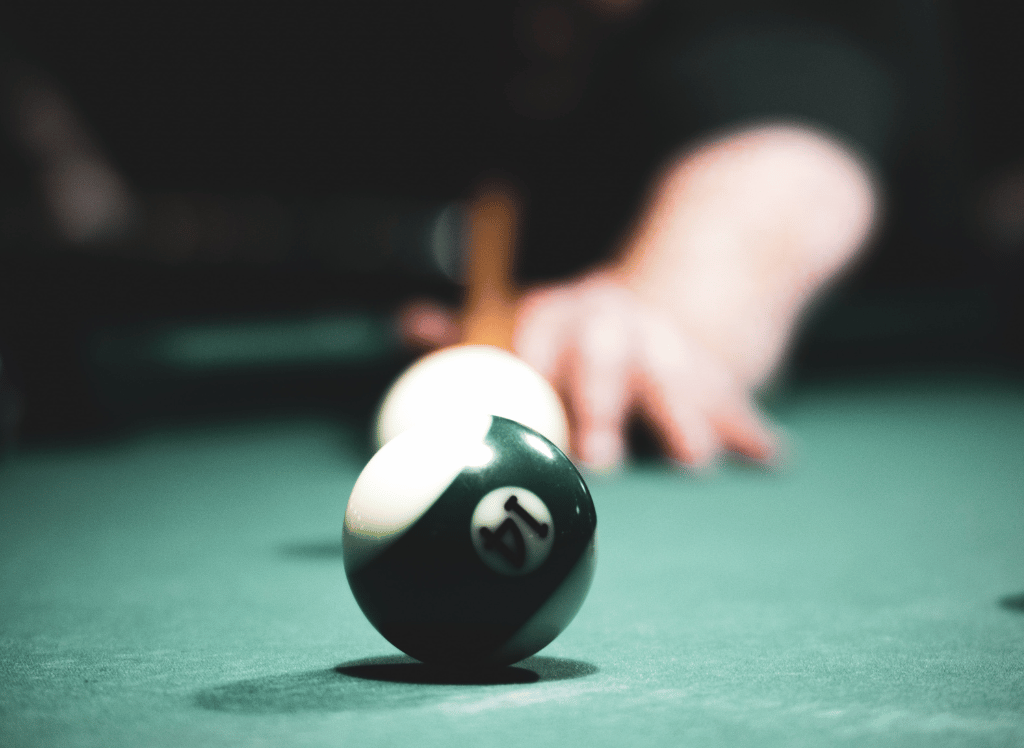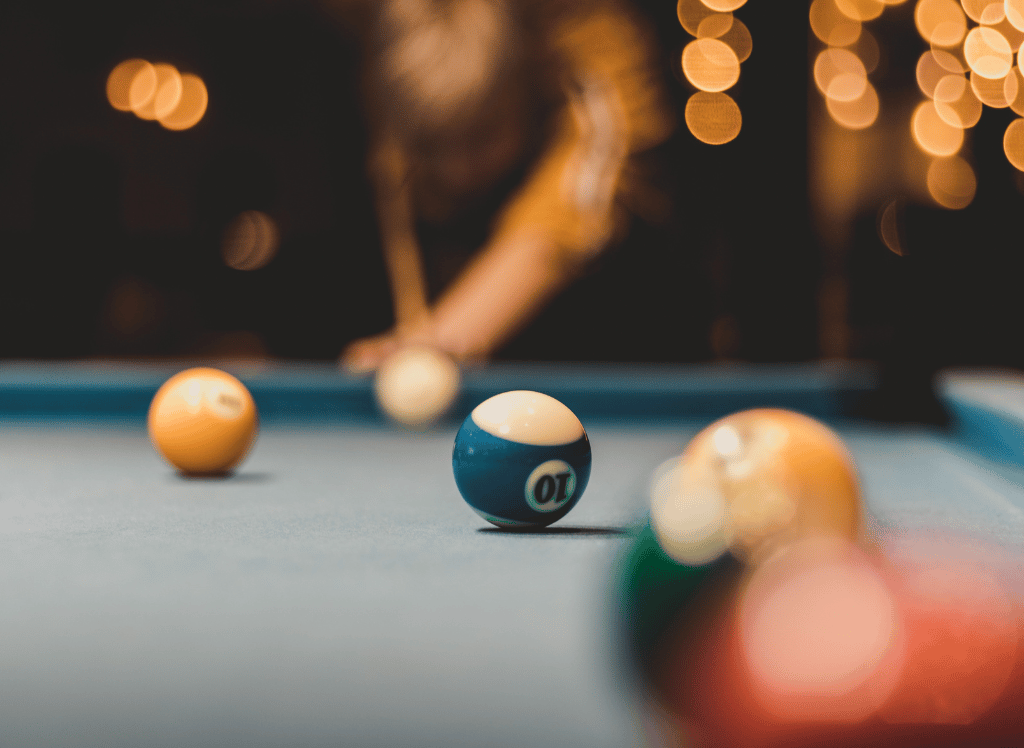You’ve likely encountered the term “scratch” before. But what happens when you scratch in pool, and how can you prevent it? This guide will delve into scratch rules, helping you better understand the ins and outs of pool, and ultimately improve your skills.
Definitions and Types
A comprehension of pool scratches begins with an introduction to some key terms. Here are the different types of scratches in pool:
- A scratch in pool happens when the cue ball is pocketed using a cue stick.
- An 8-ball scratch specifically refers to pocketing the cue ball on the 8-ball shot.
- Gameplay scratches occur when the cue ball is pocketed or sent off the table during regular play, involving both the cue ball and object ball.
- The term ‘break scratch’ is used when the cue ball is pocketed or goes off the table after being struck during the break. This is considered a foul and the incoming player receives an open table.
- A table scratch happens when the shooting player cannot move the legal object ball either to a cushion or to a pocket. This is also referred to as a foul stroke.
Grasping these definitions is a prerequisite for interpreting the rules and repercussions of scratches in pool. Scratches can occur during casual games or in competitive environments, and their consequences vary depending on the type of scratch and the specific rules in place. Acquiring knowledge of these distinctions equips you to comprehend the intricate pool scratch rules and refine your gameplay.
Now that you have a grasp of the terminology, let’s explore the consequences of scratching in pool and how they can impact your game.
Consequences of Scratching in Pool
Scratching in pool can have a significant impact on the outcome of a game. When a player scratches, they typically forfeit their turn, and their opponent is granted ball-in-hand according to the ball in hand rule. This gives the opposing player a significant advantage, as they can place the cue ball anywhere on the table and shoot at any of their balls in play.
In 🎱 ball pool, scratching has slightly different rules. Here’s how it works:
- The player forfeits their turn, and the opponent is granted ball-in-hand.
- However, if the player scratches and pockets a ball on the same turn, the pocketed balls remain in the pocket, and the turn is terminated.
- Intentionally scratching can lead to forfeiture of one’s turn and granting the adversary ball-in-hand, drastically decreasing one’s chances of success in the game.
Table scratches have consequences that depend on the specific game’s rules, with common results including ball-in-hand behind the head string or anywhere on the table. Comprehending these outcomes enables you to strategize effectively and circumvent expensive errors during gameplay.
Common Scratch Scenarios and How to Handle Them
Some common scenarios where a scratch can occur in pool are:
- On the break: If a scratch occurs on the break, the incoming player gets ball-in-hand.
- During the course of the game: If a player scratches during gameplay, they forfeit their turn. The opposing player can then place and shoot the cue ball from anywhere on the table, in any direction.
- On the shot for the 8-ball: If a player scratches while attempting to pocket the 8-ball, they lose the game.
Scratching on the 8-ball shot can have different outcomes. If the cue ball is sunk, but the 8-ball is still on the table, that counts as a foul. The game will then continue. However, if a player pockets both the cue ball and the 8-ball in the same shot, they forfeit the game. It is crucial to understand these scenarios, including the role of object balls, to handle them effectively and minimize the impact on your game.
Gaining awareness of these frequent scratch situations and their repercussions aids in preparing for and responding to them, thereby enhancing your overall pool performance.
Tips for Avoiding Scratches in Pool
There exist a few key strategies that can help mitigate the risk of scratches when playing pool. Foremost, mastering cue ball control is pivotal as it empowers players to precisely manage the speed and course of the cue ball, assisting them in avoiding accidental pocketing.
Subsequently, the choice of shot plays a significant role in preventing scratches.
Additionally, selecting shots that avoid clusters of balls or potential obstacles can help prevent scratches.
Finally, here are some tips to help you avoid scratching and elevate your overall gameplay:
- Use a proper stance and grip to ensure a stable and controlled stroke.
- Focus on hitting the cue ball with the center of the tip to minimize miscues.
- Aim for the center of the object ball to increase the chances of a successful shot.
- Control the speed and power of your stroke to prevent the cue ball from jumping off the table.
- Use a breaking cue for greater control and accuracy when striking the cue ball.
By adopting these tips, you can considerably decrease the probability of scratching and improve your game.
Legal Hits and Contact Points: Ensuring Fair Play
In pool, comprehending the notion of legal hits and contact points is key to fostering fair play and circumventing unnecessary fouls. A legal hit in pool occurs when the cue ball makes contact with the object ball, even if only partially. The object ball must also be touched by either side of the billiard table at least once before it can be legally pocketed or struck against another object ball.
Adherence to these rules aids in averting fouls and guarantees a fair game for all participants. Referees play a crucial role in enforcing these rules, serving as unbiased authorities who implement the regulations, resolve disputes, and clarify any uncertainty concerning the rules of the game.
Recognizing the significance of legal hits and contact points is integral to sustaining a fair and pleasurable pool experience for all players. By familiarizing yourself with these concepts, you can better navigate the world of pool and enhance your gameplay, while also promoting sportsmanship and fair play.
International and Tournament Scratch Rules
When participating in international or tournament pool games, it’s crucial to understand the specific scratch rules in place. In international pool regulations, scratching refers to a foul involving the cue ball, and it is considered a foul if the cue ball is pocketed, touches an object ball that had already been pocketed, or touches any object ball while it is in hand.
Most tournament regulations consider a scratch as a foul, with consequences ranging from a loss of turn, a penalty, or even an immediate forfeit. The penalty for a scratch in major pool tournaments typically involves providing the non-offending player with “ball-in-hand,” allowing them to place the cue ball anywhere on the table before taking their shot. Players who break scratch rules may face these penalties.
Gaining knowledge of international and tournament scratch rules prepares you well for competitive play and helps you steer clear of confusion during pivotal moments in the game.
Handling Disputes and Rule Confusion
Disputes and rule confusion can arise during pool games, but there are ways to handle these situations effectively. Before starting a game, it’s advisable to discuss the rules and agree upon them with all players involved. This can prevent misunderstandings and minimize the chances of disputes arising during gameplay.
If you’re uncertain about a rule, seek assistance from another player or consult the official rulebook or guidelines of the pool game being played. In cases where disputes cannot be resolved among players, a referee or experienced player can be consulted to provide an unbiased perspective and help mediate the dispute.
Adopting these measures can curb the incidence of disputes and rule confusion in your pool games, assuring a more pleasurable and equitable experience for all participants.
The Impact of Scratches on Pool Table Maintenance
Scratches on a pool table can impact its playability in various ways. Over time, scratches on the felt can accumulate and affect the trajectory of the balls, leading them to diverge from their intended course. Deep scratches or damage to the table’s surface can generate unevenness, resulting in inconsistent ball movement. Consequently, upkeep of the table’s surface and rectification of any scratches is critical to ensure optimal playability.
To repair scratches on a pool table surface, you can utilize:
- Wax filler sticks
- Burn-in shellac sticks
- Lemon oil furniture polish
- High-grade wood polish
Timely maintenance of your pool table and prompt handling of scratches guarantees a consistent and enjoyable playing experience for all.
Frequently Asked Questions
What are the rules when you scratch in pool?
In pool, a foul (scratch) occurs if the cue ball is pocketed or driven off the table after a stroke. Additionally, if the cue ball touches an already pocketed object ball, or if it is touched while in hand, it results in a foul and the opponent receives ball-in-hand on the entire table or behind the head string. The only exception to this is the break.
What are the rules for scratching on the 8-ball?
Scratching on the 8-ball is not a loss of game as long as the 8-ball was not pocketed. If a scratch occurs, the game continues with cue ball in hand for the opponent. A combination shot can never be used to legally pocket the 8-ball. If both the 8-ball and the cue ball are pocketed in the same shot, it results in an immediate forfeit.
Is it a scratch if it hits 3 walls?
If the cue ball hits three different walls but fails to pocket an object ball or have something hit a rail, then it is considered a foul rather than a scratch. This rule is known as the 3-wall rule and failure to adhere to it will result in penalties such as losing a point or awarding a point to the opponent.
How can I avoid scratches in pool?
To avoid scratches in pool, use proper cue ball control, make strategic shot selections, and invest in a breaking cue to increase control over the cue ball.
How can I handle disputes and rule confusion during a pool game?
To resolve disputes and rule confusion, it is important to discuss the rules before playing, seek guidance from other players or official rulebooks, and consider consulting a referee or experienced player to mediate.
Summary
Understanding scratch rules and their consequences is an essential aspect of improving your gameplay and ensuring fair play. By familiarizing yourself with the various types of scratches, their consequences, and strategies for avoiding them, you can navigate the world of pool with confidence and skill. Remember to maintain your pool table, handle disputes effectively, and follow international and tournament rules when participating in competitive play. Now that you’re equipped with this knowledge, you’re ready to tackle any pool game with finesse and expertise.





